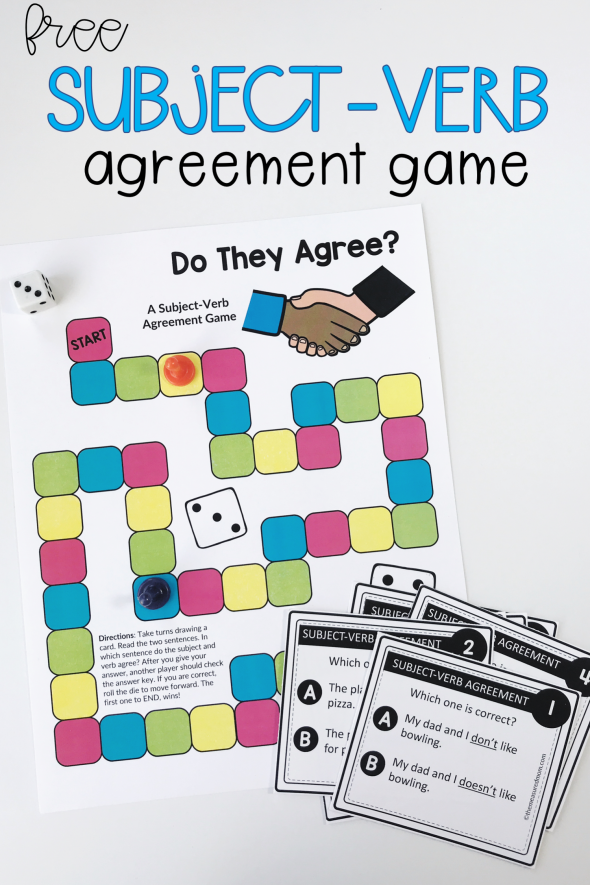
Activities for Teaching Subject-Verb Agreement Find the Subject. A quick activity like this can do a lot to reinforce the concept of subject-verb agreement.
Most of the concepts of subject-verb agreement are straightforward but exceptions to the rules can make it more complicatedFor example would you.
Teaching subject verb agreement fun way. In this case I use questions on the subject and the verb agreement. Students must answer them correctly to advance in the game. You can use image input as a kind of test at the end of your class for the wordtheme chord.
The way it works is that you will find an image with a lot of people doing things. Next students must rely on a number of sentences in their notebooks. Prepare a five- or ten-minute.
There are many fun ways to create motivation for a subject-verb agreement lesson. A good game gives a child motivation for subject -verb agreement and understanding the concept. Deal or No Deal Based on the popular television show create 25.
Hosting a fake game show can be an exciting way to teach subject-verb agreement. Set up a chart on the board with a few categories such as Singular Pronouns Plural Verbs and Difficult Subjects Assign point values to each question in the categories based on their difficulty. Ask a question out loud such as True or false.
The subject nobody takes a singular verb Let the first student to. Activities for Teaching Subject-Verb Agreement Find the Subject. Identifying the subject of a sentence is paramount to knowing which verb is appropriate.
Display a sentence that does not have subject-verb agreement. Ask the students to rewrite the. An easy way to help reinforce or introduce subjectverb agreement is to give students a short reading passage filled with various examples of this.
Then students have to quickly scan the text and highlight the subjects and verbs. After that they can compare the examples they found with a partner and then finally with the entire class. A quick activity like this can do a lot to reinforce the concept of subject-verb agreement.
Write a list of regular verbs on the board randomly. Write a list of. Students play in groups of 4 and place the cards face down in an organized fashion.
The first students turns over two cards and if they match in terms of subjectverb agreement they keep them and get a point. If not the next person goes. The game continues until all the matches are made.
To be able to teach subject and verb agreement effectively the instructor or teacher must first ensure that the students understand that subjects or nouns form their plurals in the exact opposite way that verbs form their plurals. That is the subject forms its plural by taking up an s whereas the verb forms it plural by dropping an s. In this challenging subject-verb agreement board game students combine subjects and verbs together to make grammatically correct sentences.
Give each group of four a copy of the game board a dice and counters. Players take it in turns to roll the dice and move their counter along the board. Play this fun version of Mad Libs and come up with some wacky sentences.
Come up with a story or use an existing Mad Libs page. For students who are unfamiliar with adverbs or other sentence parts limit the blanks to just nouns and verbs. Ask students to shout out suggestions for the fill-ins.
When finished recite the Mad Libs aloud to the students. After each sentence call on a student and ask him which part is. Teacher Magie explains Subject-Verb Agreement in 10 minutes.
Subject and Verb must AGREE in a sentence. Agree means to go together to have th. Again it is important to let students choose the verbs and sentences.
I prefer to let students shout out answers because I think it allows more students to p. In third grade your students are going to be learning about subjectverb agreement as well. I have always found this skill to be fairly straight-forward.
After teaching the rules students should be able to pick up this skill through practice. Teach your students the following rules. When the subject is singular the verb needs an -s.
If student B is not clear about the concept of Subject-Verb agreement he may choose the verb eat. Now she would not shake hands with him because her subject is not in agreement with his verb. Or even if she shakes hand with the student with the wrong verb some other student can point out and win bonus points for his team.
Another student from the team of verbs may stand up with the. Try Grammarly Grammar Checker - its FREE. Even though grammar can be a bit quirky from time to time there are 20 rules of subject-verb agreement that sum up the topic quite concisely.
Most of the concepts of subject-verb agreement are straightforward but exceptions to the rules can make it more complicatedFor example would you.
